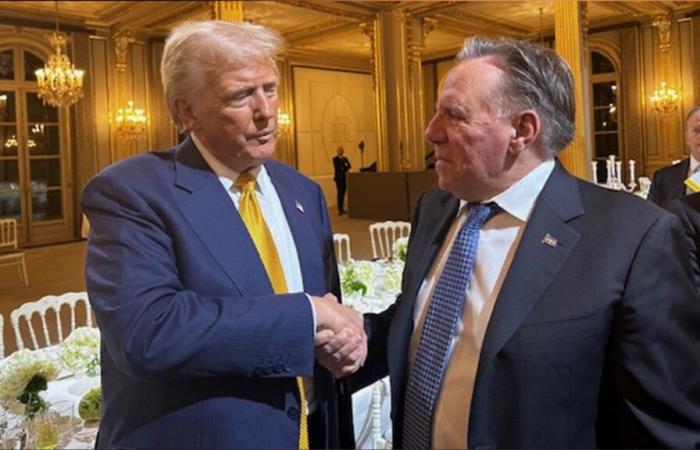According to Mr. Legault, Mr. Trump’s comments on Canada, but also on the annexation of Greenland and the American reappropriation of the Panama Canal, “must be taken seriously”, even if it “is not obviously no question of Canada becoming the 51e American State”, because “Mr. Trump will use every opportunity at his disposal to increase his balance of power,” wrote the Prime Minister of Quebec in a long reaction published on X on Wednesday.
Contrary to what the Liberal Party of Quebec (PLQ) claims, which believes that the Legault government is not sufficiently proactive in the face of Trump’s multiple economic threats, the Prime Minister says he is very active in “protecting our economy from the threat of tariffs” of the American president-elect, namely to impose tariffs of 25% on Canadian exports to the United States.
First, Mr. Legault recalls that he ordered the Ministry of Public Security to organize active surveillance of the border with the United States to respond to Trump’s concerns regarding immigration and notified the federal government that he expects a significant tightening of the granting of visas.
Will the Government of Canada grant Mr. Legault’s request regarding visas? “It’s certain that we would like to have less uncertainty in the federal government at the moment,” he agrees, referring to the announcement of the departure of Prime Minister Justin Trudeau.
Then, Mr. Legault assures that his government is pleading with American companies and elected officials that “the United States does not have the capacity to produce the equivalent of Quebec aluminum on their territory”. “Imposing 25% tariffs would hurt us, but it would also hurt American businesses that need our products, not to mention raising prices for Americans themselves,” he said.
Finally, the Prime Minister of Quebec indicated that he was going to have a meeting with the ministers of the other provinces on Wednesday afternoon in a desire for coordination, “to show a united front” and a desire to “take all means to our disposition to avoid the imposition of tariffs by the United States.”
Mr. Legault also hopes that Canada will stop being “lagging behind” in terms of military spending, a point “regularly raised by President Trump”, but for which the country is committed to achieving the objective of spending 2% of GDP, like other NATO member countries. “Quebec will also benefit from it since we have several very efficient companies in the field of defense,” he believes.
When will there be a chief negotiator?
Despite everything, the Legault government should prepare in a “more proactive way” to counter the economic threats of President-elect Donald Trump, argues the leader of the official liberal opposition, Marc Tanguay.
“We don’t feel that there is a Quebec strategy that is being developed,” worries the interim leader of the PLQ, in an interview with The Canadian Press on Wednesday.
Trump threatens to impose tariffs of 25% on Canadian exports to the United States. He even went so far as to mention the annexation of Canada under the threat of economic reprisals.
Mr. Tanguay asks Prime Minister François Legault to appoint a chief negotiator for Quebec without delay so that Quebec can have a direct interlocutor with the Trump administration, which will officially take power on January 20.
Mr. Legault committed to appointing a chief negotiator after the election of Donald Trump last November.
“Here we are in January, less than two weeks before his swearing in (that of President Donald Trump), deplores the liberal leader. Time passes, the game has begun and Quebec, without a chief negotiator, is not on the ice.”
Mr. Tanguay did not comment on the names of potential candidates he would like to see in this role. He gave the example of former Finance Minister Raymond Bachand, who was appointed by Philippe Couillard in 2017 for the renegotiation of the North American Free Trade Agreement (NAFTA) during Donald Trump’s first term.
SEE ALSO | Did Donald Trump hasten Trudeau’s departure?
He also highlighted the appointment of former Prime Minister Pierre Marc Johnson in 2009 by Jean Charest to represent Quebec in the negotiations which led to the free trade agreement with the European Union.
“It takes a person who knows the Quebec economy well, who knows the Canadian market well and who also knows American economic interests well,” summarizes Mr. Tanguay.
The Liberal leader also suggests creating “a crisis unit” within the Council of the Canadian Federation to “speak with one voice.” He also asks the government to deploy a diplomatic offensive with American states with which Quebec maintains strategic relations, such as New York or Vermont.
An appointment in “time and place”
Quebec’s chief negotiator will be named “in due course,” responds Prime Minister François Legault’s press secretary, Catherine Hamel, in a written statement. “It is important to remember that Mr. Trump has not yet been sworn in and that no trade negotiations are taking place.”
Quebec is refusing to drag its feet on this issue, as the official opposition suggests. The government created a Quebec-United States ministerial working group the day after the election of the Republican candidate. Mr. Legault and several ministers participate in this group. “Several meetings have already taken place and others are to come,” underlines Ms. Hamel.
She specifies that Quebec increased its workforce by 20% in the United States in anticipation of the American elections and upgraded the representations of Miami and Washington to delegation status. “We will firmly defend the economic interests of Quebec.”






